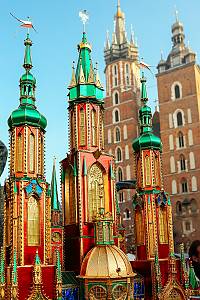The Museum of Kraków cooperates with several communities related to the intangible cultural heritage of the city: the Kraków nativity scene (szopka) makers, the Kraków bobbin lace-makers and the members of Lajkonik band.
The museum participates in the celebration of urban traditional festivals: the Emaus Fair celebrated on Monday after Easter Sunday and Rękawka Festival celebrated the day after.
All these phenomena of living heritage are affected in different ways by the coronavirus (COVID-19) pandemic. The festivals (the Emaus Fair, the Rękawka and the Lajkonik Procession celebrated during the Corpus Christi) visited by thousands of people have been canceled.
Craftsmen (including the bobbin lace-makers) usually selling their products during these festivals suffered financial losses. The educational projects (workshops of the nativity scene craft and the bobbin lace) have been canceled. It will probably not be possible to open exhibitions of the nativity scenes and the laces in the coming months.
There are a lot of uncertainties. For example, the creators don’t know if the competition for the most beautiful szopka in Kraków will take place this year. They wonder whether to start creating their nativity scenes or not. Due to movement restrictions, it is more difficult to purchase materials. Many shops are closed. Not all materials are easy to buy in online stores.
The makers try to consult together online (for example, lace makers send stencils to themselves). On the other hand, some nativity scene makers declare that they now have more time to create their nativity scenes.
The pandemic has caused the need to start activity in the Internet. An example of recent days is the competition for the most beautiful Emaus tree 2020 was conducted and settled on Facebook. The new projects are planned such as an on-line course of the Kraków nativity scene making.
Les désignations employées et la présentation des textes et des documents référencés dans cette plateforme n'impliquent de la part de l'UNESCO aucune prise de position quant au statut juridique des pays, territoires, villes ou zones, ou de leurs autorités, ni quant au tracé de leurs frontières ou limites.
